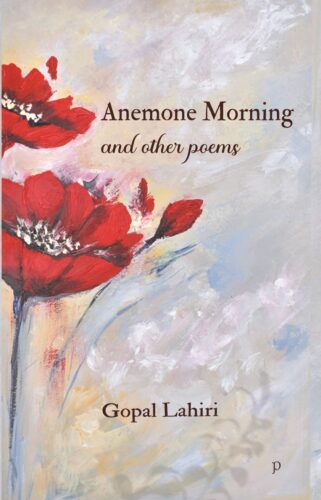As I picked up Gopal Lahiri’s book of poems, Anemone Morning and Other Poems, I was stuck by the choice of the word Anemone. The cover of the book significantly highlighted the importance of the word anemone by portraying two of these flowers peeping against a blue sky. Anemones are wild flowers. Yet they have been burdened with symbolism right from the Greek to the Biblical to the Chinese and other cultures. They often stand for death, or for luck. But most importantly, anemones, stand for both fragility and resilience – a duality that we often encounter in our lives. Poetry also exists in that liminal space of dualities – to be or not to be, and that is why, these flowers can be such an apt vehicle for carrying the poet’s thoughts.
Anemone Morning and Other Poems is an esoteric collection of poems in terms of forms and structure, tied together by their deep connection with nature. The title poem that is also the first poem of the anthology is a paean to yellow anemones which is associated with optimism and hope. The poet finds himself standing at the edge of the ‘yellow floral sea’ of anemones. There is a desire for stillness, a search to look within oneself, to meditate. The ‘screaming for silence’ brings out the dichotomy of one’s inherent restlessness and the need for quietude. The poet wants to ‘sink deep’ and ‘get carried away’ perhaps in his own poetic explorations, making this poem an apt gateway to his world of poetry.
Nature has been a consistent presence in Gopal Lahiri’s poems. Be it Return to Solitude or Alleys are filled with Future Alphabets, the poet has drawn his inspiration from the natural surroundings. Nature remains one of the prominent metaphors even in this newest collection of his poems, Anemone Morning and Other Poems. But the poet is more intense here, and the images are more closely tied up with the emotional and spiritual journey of the poet juxtaposed against human actions.
Divided into four parts, the ‘Resurrection’, ‘Dreamers’ Search – Green Path’, ‘Mind’s Eye’, and ‘Miscellany’, these poems speak of solitude, love, memory, ecology, inner journey and much more, nature being the connecting bond between each of them. The first section, ‘Resurrection’ is an exploration of the self, to find one’s identity. The poetic persona seeks to resurrect itself, by recreating the self in various ways. The poet says, ‘Let me begin/ I revive myself in my dreams” (Recreate), where nights are the much needed time for the soul. In another poem, ‘Single Sleep’, the poet finds he and his beloved ‘have woken from a single sleep, from the dream of our entire lives’. In an echo of Donne’s poem, ‘Goodmorrow’, this line celebrates love as the moment of awakening of the soul, converging in a moment of the meeting of the lovers’ eyes.
In the second section, ‘Dreamers’ Search – Green Path’, the poet engages with ecocritical issues, as the title suggests. Anthropocene activities and their effect on earth has deeply impacted the poet as becomes evident from the poems collected in this section of the volume. In the first section, nature is the catalyst that resurrects the poet – and the section ends rightly with the poem, the ‘Aha moment’ where the self and its surrounding are in complete harmony – ‘lying down on the tenderness of grass/ it suffices, it is all divine’. But the tone changes in the second part. The fear surfaces, threat is posed by human actions. The poems ‘First Page’, ‘Acceptance’, ‘End Game’, ‘Annihilation’ – talks of the Anthropocene concerns. In both ‘First Page’ and ‘Acceptance’ the poet voices concern regarding plastic pollution which holds the capacity to wipe out species, including human beings. Like a seer he forebodes a future in which extinction will become the rule and survival, a chance. Yet, Gopal Lahiri is a poet of hope and that is what inspires him to write the poem, ‘Change’. It is a song of harmony. Though sans the human presence, it is a picture of rejuvenated earth – ‘the air is blowing/ with petrichor, barren land is awakened/ and dance to the tune of rain’.
The section titled ‘Mind’s Eye’ is the poet’s journey within. But this journey is also one of negotiating the the everyday world. The poet’s eye deciphers the illness, the violence and degrtadation that has grabbed the social fabric. Images and metaphors too turn more violent in this section, ‘There is a hole in every thumb/ several wrong words appear on my pages/ feelings of desolation and despair’ (Amnesia). Violence of gender (Armchair Puzzle), exploitation (Chillness) and other issues disturb and disrupt the poet’s moral universe and once again, the poet seeks refuge in darkness – ‘I walk on a long sandbank in my dreams,/ dodging refuse and dirt on every side of the road/ slowly I slip into one-square kilometre of darkness’ (Small Wonder). The poet here is critical and observant and the nature too keeps him company, reflecting the sombreness of his mood – ‘A still air over the palm grove as if a storm is coming in’ (Hidden Fountains).
In the last section, the poet experiments with forms. There are gogyoshi, haibun, senryu and haiku. Gopal Lahiri has always been an expert of poetry in small forms and here too he does not disappoint. Juxtaposing the human and the nature, manmade as well as natural, he creates a unique world.
This collection of poetry, published from Penprints Kolkata, is one of Goapl Lahiri’s best works. Gleaning images from his habitat, both human and nonhuman, Lahiri explores the world around him. He seeks repose in oneness with nature much like Wordsworth but at the same time, his pen chronicles the ills of the modern city. There are Eliotesque overtones in some of his poems as well. The poet is the true spokesperson of his times here and his poems, particularly in the second and third sections, force us to think of our actions. The poems carry a note of concern, yet the poet’s expertise of his craft does not make them pedagogical. Gopal Lahiri’s poetry is a delight to read with his abundance of images, colours, topographical reference, and human habitats. Yet they preach, not from the pulpit but by innocuous disruption of one’s comfort zone.
*
Anemone Morning and Other Poems by Gopal Lahiri
Published by – Penprints
First Edition – April 2024
Price 350 INR
No of Pages – 140









Add comment